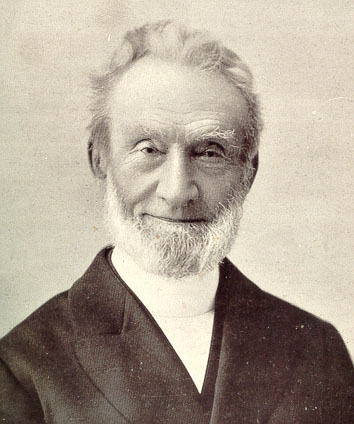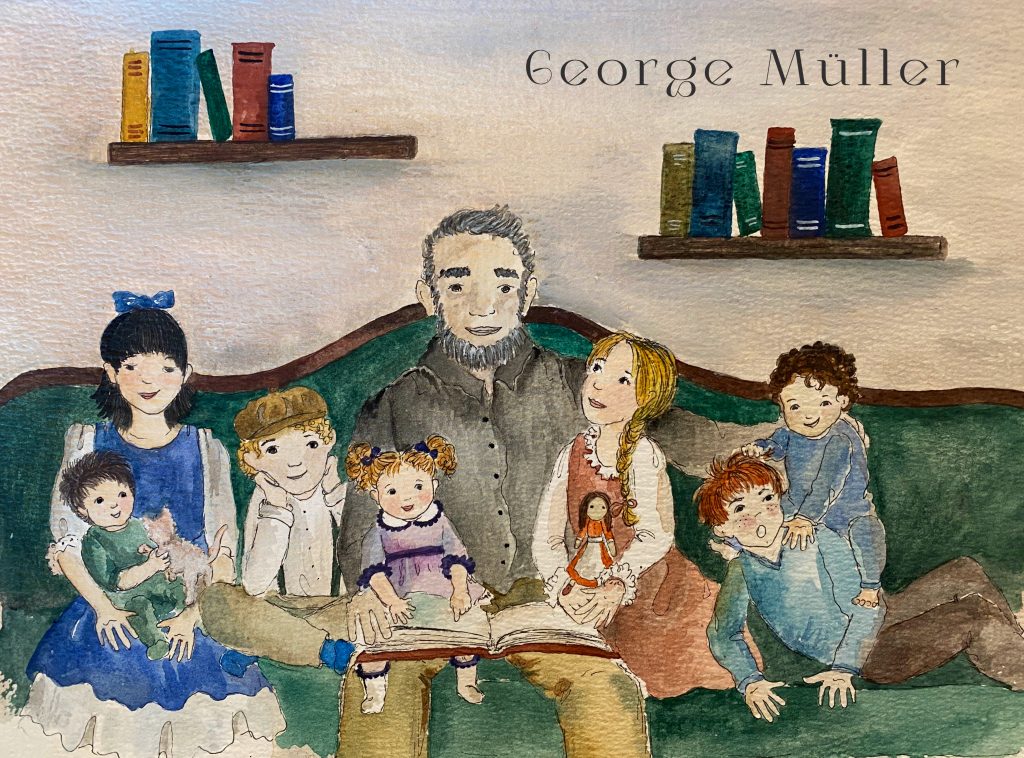And we’re back with the amazing story of George Müller!
A young boy entered his father’s large study in their spacious home in Kroppenstedt, Germany. He looked around hastily before shutting the door and walking over to the oak desk. His hands didn’t even shake in fear as he opened the drawer and pulled out 5 pounds from among the other banknotes. ‘More than enough for tonight’s drink’, he thought as he pocketed the money.
George, son of a tax collector, Johann Friedrich Müller and his mother Sophie Eleonore, was naughty as a child and wicked as a young man. Johann was a worldly man who cared nothing for religion and gave his sons money which they spent foolishly. When George was ten, his father sent him to the cathedral school at Halberstadt so that he might become a Lutheran clergyman and have a comfortable living.
But, even at this young age, whenever George was not studying he was indulging in evils. There was almost no sin that was not committed by him. On the night of his mothers death, 14 year old George was away from home playing cards until past midnight and the next day, Sunday, he spent at the tavern. Whenever he thought of leading a better life, he would plunge deeper into sin. He stole, lied, cheated, gambled and his manner and speech were impulsive.
When George was 16 years old, he was imprisoned for trying to defraud the landlord of a wealthy inn in Brunswick. When he was released and had returned home, his father thrashed him and forbade him from leaving again. Because of this, George changed his ways outwardly so that he could regain his fathers trust. When this was accomplished, his father sent him to a strict school at Halle. Instead, deceiving his father, George went to Nordhausen where he stayed for over two years, studying diligently. He mastered Latin, French, German (his mother tongue), and History.
Müller later wrote of this time, “But whilst I was outwardly gaining the esteem of my fellow-creatures, I did not care in the least about God, but lived secretly in much sin, in consequence of which I was taken ill, and for thirteen weeks confined to my room. All this time I had no real sorrow of heart, yet being under certain natural impressions of religion, I read through Klopstock’s works, without weariness. I cared nothing about the Word of God.”
George tried to amend his ways by taking the Lord’s supper twice a year. He would strive to be serious for a day or two, make new resolutions and swear to become better, but, in a few days his plans to reform were forgotten.
When he entered the University at Halle as a divinity student, he was qualified to speak in the Lutheran church. There, he continued his pattern of sinful indulgence. He later wrote of the battle within: “When my money was spent, I pawned my watch and part of my linen and clothes, or borrowed in other ways. Yet in the midst of all this, I had a desire to renounce this wretched life, for I had no enjoyment in it, and had sense enough left to see, that the end one day or other would be miserable; for I should never get a living. But I had no sorrow of heart on account of offending God.”
One Saturday afternoon in 1825, George took a long walk with his friend, Beta who lived much the same lifestyle as himself. Beta told him that he always attended a service in the house of a Christian on Saturday evenings. At once, George felt that this is exactly what he had been looking for his whole life. He asked his reluctant friend if he might join him.
George was very impressed by the meeting and the warmth of the Christians who gathered. “I was happy,” he said, “though if I had been asked why I was happy, I could not clearly have explained it.”
That very night, the Lord began a work in Müller’s heart, “I have not the least doubt that on that evening He began a work of grace in me, though I obtained joy without any deep sorrow of heart, and with scarcely any knowledge. But that evening was the turning point in my life. The next day, and Monday, and once or twice besides, I went again to the house of this brother, where I read the Scriptures with him and another brother; for it was too long for me to wait until Saturday came again.”
His life began to take on a new purpose and he grew convicted of his sins. He left his wicked friends, stopped going to the tavern and worked at telling the truth at all times. Although he still fell into his old ways often, he was now on the straight and narrow and his heart was struck by his wickedness. He loved reading the Scriptures, praying, being with the church family, and going to church, now for the right reasons. When his friends laughed at him, he stood for Christ and would not be moved.
Just a few weeks after his conversion, Müller felt the desire to be a missionary. This desire was almost forgotten until he saw a missionary leave all for the Gospel’s sake. He said that he, “began to enjoy the peace of God, which passeth all understanding. In this my joy I wrote to my father and brother, entreating them to seek the Lord, and telling them how happy I was; thinking, that if the way to happiness were set before them, they would gladly embrace it. To my great surprise an angry answer was returned.”
Because he could not join a missionary training institution without his father’s consent, he used the means that the Lord sent him to complete his education and taught German to some American professors at the University who paid him well.
Whenever young George walked the streets, he handed out gospel tracts and printed sermons. Due to the prayer meetings held in George’s room, the number of true believers at the University tripled before he left.
At twenty-four years, George travelled to England where he applied to be sent as a missionary to Jews. He knew very little English and was very ill when he arrived. The sicker Müller got, the happier he became. He knew that all his sins were completely forgiven and he longed to be with his Lord.
He recovered after about one month and submitted himself to the will of God from this time on. He laid his all at Christ’s feet and became a great lover of God’s word. George began to spend hours and hours in prayer and meditation of the Scriptures.
Soon after George became the pastor of Ebenezer Chapel in Devonshire, he and Miss Mary Groves were married. They had a long and happy marriage. George and Mary decided that they would trust in the Lord for all their needs and discontinued his weekly salary and pew renting in their church. The couple told their needs only to God and trusted him for their daily bread.
In 1832, the Müllers began their work in Bristol. George co-pastored with his friend Mr. Craik who was also called to that area. They were greatly blessed and the church membership quadrupled in a short time. So much so, that other churches had to be begun and shepherded. At this time, Mary gave birth to their only surviving child, Lydia.
As the ministry grew, Müller desired to do something for Bristol’s many orphans. They started small, receiving whoever came to them. In April 1836, they opened a large house on Wilson Street. Soon, as thousands of children came they opened five homes for orphaned children at Ashley Down. With these houses to pay for and the children and staff to provide for, Müller never once asked for funds and never went into debt.
Their needs were always provided for, to the hour. They never went without three meals a day, never ran out of garments for the many children and never had to send a needy child away. The Müllers secret was prayer. They prayed in faith believing that the Lord would answer. Their needs were supplied miraculously by donations and timely blessings from kindly neighbors.
After Mary’s death in 1870, George married Susanah Grace Sanger. In his later years, Mr. Müller left the orphans to the care of his son in law, James Wright and went on a series of mission trips with his wife. They travelled all over Britain, the Continent of Europe, North America and Canada, Australia, India, China- 42 countries in all. In every place George Müller preached the Gospel, fellowshipped with and built up the believers. Because of his love for the Lord’s, no doors were closed to him.
 George Müller was a man of simple faith who hungered after God’s word and loved talking with his Savior. He believed the Word, acted on it and it was proved true again and again. Müller was often heard to say, “I am a happy man.”
George Müller was a man of simple faith who hungered after God’s word and loved talking with his Savior. He believed the Word, acted on it and it was proved true again and again. Müller was often heard to say, “I am a happy man.”
On March 10, 1898, 93 year old George Müller suddenly and peacefully passed into eternity.
May we be encouraged by George Müllers example of faith and his great usefulness in the kingdom of God. Müller saw something that needed doing and he did it. He sacrificed wealth, comfort and a peaceful retirement and cared for ‘the least of these’. And he said, “I have lacked nothing-nothing.”
“Faith is the assurance that the thing which God has said in His Word is true, and that God will act according to what He has said in His Word. This assurance, this reliance on God’s Word, this confidence is faith.”
– George Müller




